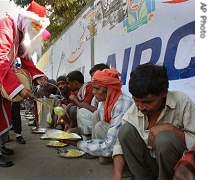2007年VOA标准英语-60 Years After Independence, Many in India Pros
搜索关注在线英语听力室公众号:tingroom,领取免费英语资料大礼包。
(单词翻译)
New Delhi21 August 2007
India this month celebrates 60 years of independence, and many have paid tribute to a growing economy that has begun to make a mark around the world. But as Anjana Pasricha reports, others expressed concern about the need to spread the benefits of the economic boom to millions of people still mired1 in poverty.

A man dressed as a Santa Claus distributes food to poor people, in Gauhati, India (File)
Two years after graduating from business school in 2005, Mansi Chadha is on her second job. She is taking advantage of a thriving job market, where salaries are rising quickly.
"A lot of opportunities, the growth is tremendous, you have more options now than you ever did," she said. "And you also want to try different things, and people want to keep jumping levels."
Mansi's father, Vinod Chadha recalls a dramatically different situation 30 years ago, when he began his career as an accountant.
"There were no options to join the corporates," he said. "The opportunities were very, very scarce. To get a good job probably one needed a good contact, a good referral."
He grew up when India's founding fathers were building a socialist3 economy, hoping to lift the newly independent country out of poverty.
The goal was self-sufficiency. The symbol was the spinning wheel. India wanted to manufacture its own goods, and to keep foreign investors4 out.
The result: the country produced an uncompetitive private industry, an inefficient5 public sector6, and low growth rates.
India took a U-turn in 1991, when it was on the verge7 of defaulting on its international debt. It began opening its economy and unleashed8 a revolution that is transforming the country.
D.H. Pai Panindiker heads an economic research group, the RPG Goenka Foundation, in New Delhi. He says liberalization gave free play to the energies of Indian entrepreneurs, businessmen, and educated middle class.
"There was no imposition by the government about what to produce, where to produce, what price to charge," he said. "With that choice they were free to compete. In a short period of about seven or eight years, the Indian industry really matured and is now in a position to compete in the international market."
Today, increasingly confident Indian businesses are scouting9 from East Asia to Europe for opportunities, buying everything from steel plants to hotels.
The flourishing economy, growing at around eight percent a year, has produced a huge middle class.
With ample opportunities at home, youngsters such as Mansi Chadha no longer yearn10 to work in the United States or Europe - the dream for the middle class until the 1990s.
"The urge is not there, I think there is a lot more learning in India," she added. "A lot of exciting things are happening in India right now."
Young professionals now shop for cars, televisions and luxury goods much sooner that their parents could dream of doing. They are no longer restricted to local products, they can opt2 for global brands such as Sony, Ford11, LG or Nokia, which have all arrived in the past decade.
These multinationals12 are expanding furiously in India, not only to tap the growing consumer market, but also to use it as a manufacturing base and to harness the skills of its engineers and technocrats13.
But the economic boom has not trickled15 down to the poorest communities, and tens of millions of people still live on less than $1 a day.
So when Prime Minister Manmohan Singh gave a speech on Independence Day (August 15), he stressed the need to reach out to the India left behind, saying "We will have freedom and independence only when we get rid of poverty."
The prime minister said employment is crucial to end poverty, and pledged to press ahead with policies that create jobs and spread the benefits of industrialization.
Indeed the poverty that India's founding fathers wanted to end is never far away. Hunger stalks the countryside, more than one quarter of Indian children are malnourished. Health care is poor, millions are out of school, huge slums fester in the cities.
As a result, since independence, little has changed for families like that 40-year-old Babu Singh, a street hawker.
He says his parents struggled for a lifetime in a village to ensure that there was enough food to go around.
He migrated to the city, but things are not much better. Like them, he has no savings16, no social security, and no hope that his children will have a better future.
Economist17 Pai Panindiker says the fruits of development must be more equitably18 shared.
"It is important to bring these into the mainstream," he said. "It [the boom] cannot be sustained unless it is shared by all sections of society."
Most Indians recognize that the next big challenge will be to bridge the widening divide between the country's middle class and the poor.
The pessimists19 worry that social unrest will rise if that does not happen; the optimists20 say the process may be slow, but growth will trickle14 down.
 收听单词发音
收听单词发音 




